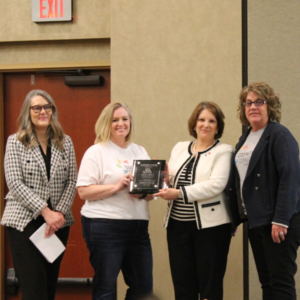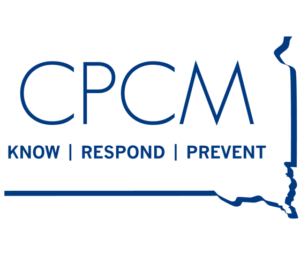Codington County Community Celebrates Resilient Community Designation
A nearly two-year process culminated April 18 as Codington County was designated as a Resilient Community by Center for the Prevention of Child Maltreatment.
The ceremony included remarks from Darla Biel of CPCM and Dean Haifa Samra, University of South Dakota’s School of Health Sciences recognizing the community’s efforts in bridging gaps for area youth since late 2021. City of Watertown Mayor Ried Holien, Codington County Commissioner Lee Gabel, Terri Meilitz, CASA Director & Facilitating team member, and Circuit Third Court Judge Carmen Means spoke on the importance of the designation to the safety of children and families. Codington County is the second community in South Dakota to receive this designation.
Codington County becomes a Resilient Community because of a coalition of local stakeholders from healthcare, behavioral health, government, non-profits, and education that analyzed current strengths of Codington County that help children and families deal with and recover from traumatic experiences, thereby aiming to mitigate long-lasting effects, referred to as Adverse Childhood Experiences (ACEs). They also identified gaps that could be filled through a multidisciplinary approach to resource delivery.
“This designation is an important recognition of the work our community has done to raise awareness of the impact of ACEs,” said Sara Foust, facilitating team member. “Codington County is committed to building resiliency for our youth. The Social Services Advisory Council will continue to collaboratively work together to address needs in our community. We also have several learning opportunities and activities planned for the coming year.”
South Dakota children are facing child abuse and maltreatment at an alarming rate. Research shows that ACEs have a direct impact on an individual’s nervous system and brain development, which creates long-term mental and physical health issues as well as an increase in at-risk behavior. The good news is maltreatment is preventable. Understanding the impact of ACEs and factors that mitigate those effects can lessen the long-term harm the abuse causes. ACEs include 10 different forms of childhood maltreatment (household dysfunction, abuse and neglect) that have been researched since 1992.
“Resilient Communities allowed Codington County advocates to work together to overcome gaps in services to provide informed primary prevention strategies to our service leaders,” said Darla Biel, Assistant Director of the Center for the Prevention of Child Maltreatment. “Your community is stronger because of the work you’ve done to create unity.”
Resilient Communities, South Dakota, was created by the Center for the Prevention of Child Maltreatment and its partner organizations to help address factors in communities that put children at risk for abuse and neglect. It also creates an environment that is trauma-informed, so community members understand the effects of experiencing abuse. The process also identifies existing resources in the community that can be used to strengthen prevention efforts.


